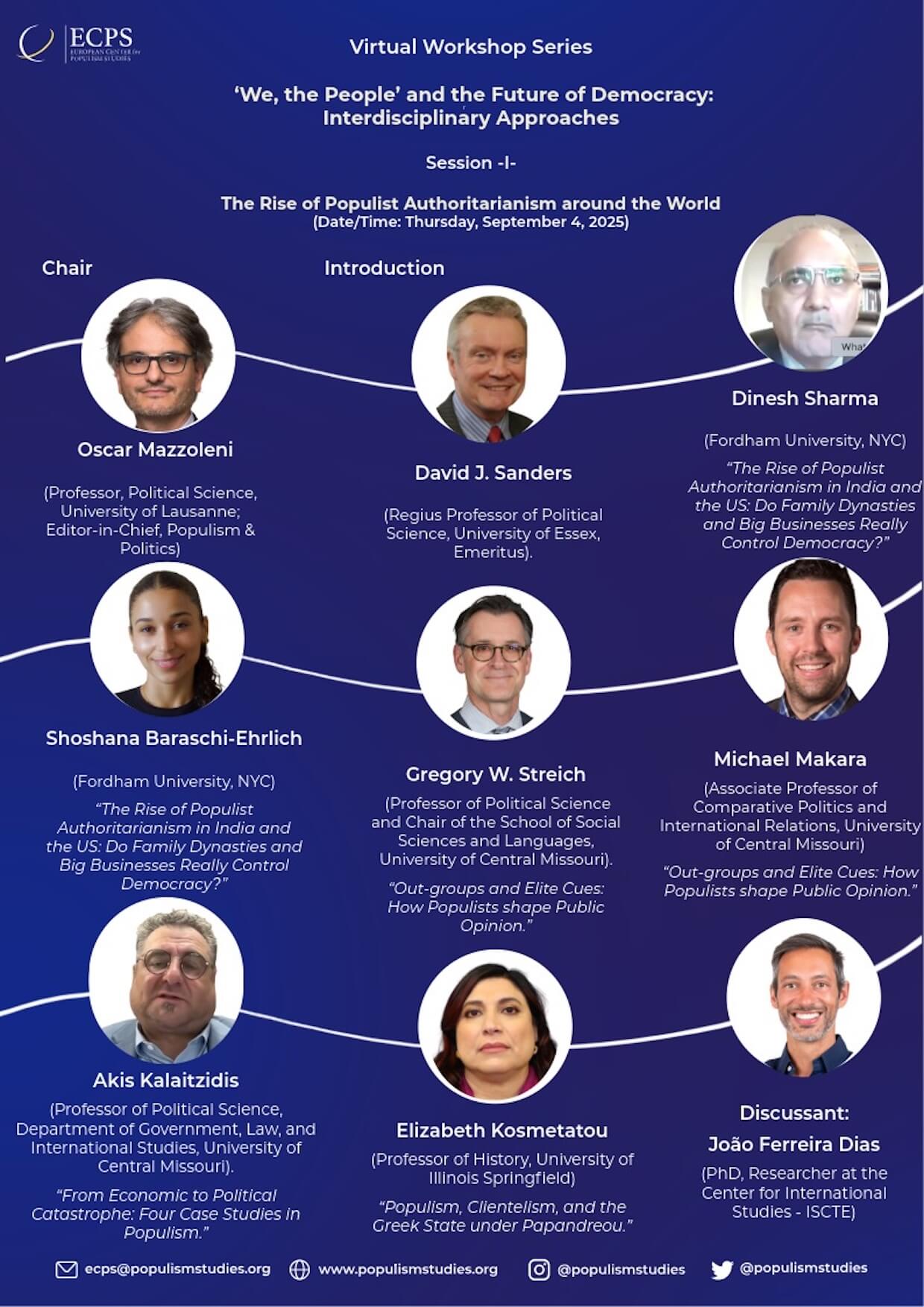The ECPS, in collaboration with Oxford University, launched its Virtual Workshop Series on “The Rise of Populist Authoritarianism around the World” on September 4, 2025. Spanning 16 sessions through April 2026, the series examines how populist strategies reshape democracy across diverse contexts. Chaired by Professor Oscar Mazzoleni, the opening session featured Professor David Sanders’ keynote on six structural drivers fueling populism and its growing threats to liberal democracy. Case studies explored populist dynamics in the US, India, Greece, Thailand, and Argentina, highlighting intersections of dynasties, corporate power, elite cues, and economic crises. Discussant Dr. João Ferreira Dias emphasized three takeaways: populism as performance, polarization over persuasion, and the enduring impact of national political cultures.
Reported by ECPS Staff
The European Center for Populism Studies (ECPS), in collaboration with Oxford University, inaugurated its Virtual Workshop Series with the opening session, “The Rise of Populist Authoritarianism around the World,” held on Thursday, September 4, 2025. Spanning 16 sessions from September 2025 to April 2026, the programme brings together leading scholars to examine the contested meanings of “the people” and their pivotal role in shaping the trajectory of democracy across diverse political, cultural, and institutional settings. Designed as a continuation of the successful three-day in-person conference at St. Cross College, Oxford University (July 1–3, 2025) — “‘We, the People’ and the Future of Democracy: Interdisciplinary Approaches,” — the series deepens and extends those debates, fostering comparative, cross-disciplinary dialogue on democratic backsliding, resilience, and transformation in a rapidly shifting global landscape.
Opening on behalf of ECPS, Stella Schade outlined the series’ comparative and cross-disciplinary ambition: to move beyond regional silos and examine how populist projects travel, adapt, and entrench themselves within distinct political and media ecologies.
Chaired by Professor Oscar Mazzoleni (University of Lausanne), a leading authority on populism and party systems, the session framed populist authoritarianism not as a single doctrine but as a repertoire of strategies—discursive, organizational, and institutional—deployed under diverse conditions.
Professor David Sanders (University of Essex, Emeritus) set the analytical agenda with a wide-ranging keynote that argued populism poses greater risks to liberal democracy today than in earlier cycles, owing to transnational diffusion of tactics and the erosion of shared standards of truth. He identified six structural drivers—declining left–right anchors, post-truth dynamics, politicized immigration, identity fragmentation, globalization’s discontents, and norm subversion through strategic learning—and outlined five fronts for democratic response, from inclusive immigration policy and rebalanced rights discourse to retooled economic governance, renewed state capacity, and robust platform regulation.
The panel that followed translated these themes into concrete case studies. Dr. Dinesh Sharma and Shoshana Baraschi-Ehrlich (Fordham University) traced the entanglement of family dynasties, corporate finance, and “outsider” populist narratives in India and the United States, highlighting the paradox whereby leaders mobilize anti-elite sentiment while constructing elite power networks of their own.
Professor Gregory W. Streich and Dr. Michael Makara (University of Central Missouri) examined how elite cues and out-group framing shape opinion formation, showing that populist endorsements polarize more than they persuade and exert greatest influence on low-salience issues where prior beliefs are weak.
Professor Akis Kalaitzidis (University of Central Missouri) offered a comparative analysis of Thailand, Argentina, Greece, and the United States to argue that economic dislocations catalyze distinct populist trajectories, each filtered through national political cultures and institutional constraints.
Professor Elizabeth Kosmetatou (University of Illinois Springfield), in joint work with Kalaitzidis, revisited the Papandreou era to illuminate how charismatic leadership, clientelism, and European integration jointly reconfigured Greece’s political economy, leaving a durable imprint on state capacity and party competition.
Serving as discussant, Dr. João Ferreira Dias synthesized the contributions around three cross-cutting claims: populism functions as performance more than program; polarization, not persuasion, is its primary mass effect; and national political cultures mediate how populist styles are institutionalized. His commentary linked micro-level mechanics (elite cues, media incentives) to macro-level outcomes (executive aggrandizement, clientelist normalization), underscoring the session’s central lesson: understanding populist authoritarianism requires attention to both the technologies of mobilization and the structures that enable their entrenchment.
As the series unfolds, ECPS and its partners will continue to probe these dynamics comparatively, asking not only how democracies backslide, but also how they can be renewed.



